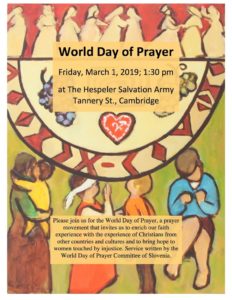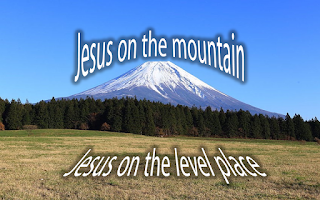 |
Please join us at 10:00 am for the First Sunday in Lent. The scripture readings for this Sunday are: The sermon title is: Desert Days If you have any questions or comments about the scripture readings or the message please contact Rev. Scott McAndless at [email protected] Explorations in Music (for JK - grade 6) begins on Sunday, at 11:15 am in the Fellowship Room; snacks & drinks provided. |
Pancake Tuesday
Continue reading »In the fading afterglow
Readings, March 3, 2019 © Scott McAndless
Exodus 34:29-35, Psalm 99:1-9, 2 Corinthians 3:12-4:2, Luke 9:28-36
| I |
have been there. There have been moments in my life when I can truly say that I went where Moses went – into the very presence of God. Oh, not literally the same place that Moses went and maybe not in the presence of God in exactly the same way but, yes, there are moments that I can point to when I had absolutely no doubt and no other way to explain it than to say that I had just experienced God. Sometimes it has happened in subtle ways that nobody would have even noticed who was around me. Sometimes it has come while interpreting scripture and when I saw a special connection or deeper understanding that I knew I could not have found by myself – the spirit of God must have been operating within me.
Other moments have been more dramatic. I will never forget the time, for example, when I was literally out of money. I didn’t tell anyone but I didn’t know how I was going to get my next meal. And yet, in that moment, I impulsively chose to make a donation of my last five dollars to a worthy offering that was being taken. It was an act of faith and trust that was perhaps foolish, but I did it. I still do not know to this day how a twenty dollar bill ended up in my mailbox the following morning. Surely God had given someone a little nudge.
And yes, of course, there have also been those moments of greatest drama when, in the midst of worship or in the midst of a crisis I just knew. Every fibre of my being just reoriented to the certainty that I was in the presence of someone far beyond my understanding.
I have experienced the presence of God. I imagine that many of you have had such moments as well. Now, since such things are personal experiences, they are usually not shared. For that reason, I cannot really use my personal experiences to prove to you that God exists. Spiritual experience is not about proof. It does, however, play an important part in the formation and forms of human religion.
The model for how that works is demonstrated in how the Book of Exodus tells us that Moses gave spiritual leadership to the people of Israel. He would go into the tabernacle – a portable sanctuary that the Israelites would carry with them – and there he would have an experience of the presence of God. What that experience was – how exactly God was there for Moses in the tent – we do not know. We cannot know because it was Moses’ own personal experience. Nobody else could share in it and you could not prove that God was there in the tent to anybody but Moses.
Nevertheless, on the basis of his own personal experience, while the afterglow of that experience was still on him and slowly fading, Moses would speak to his people and give insights and commandments to them based on what he had experienced. But, after a time, that afterglow faded, the experience became less potent in his mind, and so the time of sharing based on it would come to an end. Moses would cover his face with a veil and for a time, they would only have the wisdom given in the afterglow to fall back on until it was time for Moses to have another personal experience of God in the tabernacle.
Now, in Exodus, this is all told in quite literal fashion. Moses’ face glows with a real and frightening light which slowly fades away. He then literally covers his face with a veil during the interim time. But I would say that this is how spiritual experience always works if you set aside the literal details. Whenever a spiritual leader has a powerful experience, there is a time when he or she is able to give great wisdom and insight in the fading afterglow of that experience. But then that afterglow wisdom gets codified and even turned into law to guide the community through the period of the veil – the time when no particular guidance comes through spiritual experience.
That is how it has always worked in many faiths, not just our own. It is a fairly natural way for human beings to respond to experiences of the divine. We see the very same pattern, for example, in our gospel reading this morning. Peter, James and John go up a high mountain where they have an experience of God in Jesus Christ – a powerful experience marked, once again, by glowing white light. Peter’s response, in the fading afterglow of that powerful experience, is to want to codify it. “Let us make three dwellings,” he says, “one for you, one for Moses, and one for Elijah.” He wants to set up religious buildings where they can process the experience and turn it into commandments and regulations, just like Moses did when he came out of the tabernacle. He wants to do this so that the experience might sustain them through the long period of the veil when there is no dramatic God experience.
So that is the pattern. And it is a good pattern that human beings have developed to deal with the fact that people do sometimes have incredible spiritual experiences of God, the power of that experience fades and then we tend to go through long periods of veil time when there is no revelation. In many ways, you might say that that’s what religion is. It is the institutional structures that we build in the fading afterglow of experiences of the divine – structures that are designed to get us through the veil time.
But, while that is a natural human thing and while it is what Moses did, you probably picked up a little note in our reading from the gospel this morning – a note that seemed to indicate that Simon Peter didn’t actually respond in the right way. Jesus doesn’t say anything, but what happens immediately afterwards – the encompassing cloud, the mindless terror and the words, “This is my Son, my Chosen; listen to him!” booming from heaven, all seem to indicate that Peter didn’t quite get his response right. But what did he do wrong? What is inappropriate in what he says?
That brings us, finally, to our reading this morning from Paul’s letter to the Corinthians. In this letter, Paul is talking specifically about the very passage we’ve been discussing – about the whole description of Moses having these face-to-face experiences with God, giving laws and rules and commandments in the fading afterglow, and then putting on the veil to signify the time when that direct experience of God is completely absent. Paul understands where this comes from, but he also explains what is wrong with this model of relating to God.
Paul writes this: “Since, then, we have such a hope, we act with great boldness, not like Moses, who put a veil over his face to keep the people of Israel from gazing at the end of the glory that was being set aside.” The problem, Paul says, is the veil. And what does the veil represent? It represents that long period of time when the direct experience of God is absent. In fact, it represents the fear of God’s continued absence. We are afraid, having had these extraordinary experiences of God at some point, that it will never happen again. And so we set ourselves up to try and make it through that long period of the veil. That is what the fading afterglow time is all about. We try to codify, to reduce the experience down to laws and rules, so that they may continue to guide us when the experience of God is absent.
The problem with all of that, from Paul’s point of view, is that it’s all motivated by fear. Having had an experience of God’s presence, we are afraid of the absence of that experience. In many ways that is the history of religion. It is the story of people who had extraordinary experiences of God and then created a religion to guide people in the absence of that experience. Now, Paul does not deny the power of those kinds of experiences. He had some of his own. They were very important and formative to him. But Paul actually resists using the fading afterglow of his experiences of the risen Christ, to give laws and rules. For him, laws and rules are the problem, not the solution.
For him, the point of whatever experience of Christ you have is not to give you rules to live by. It is to transform you. “And all of us, with unveiled faces, seeing the glory of the Lord as though reflected in a mirror, are being transformed into the same image from one degree of glory to another; for this comes from the Lord, the Spirit.”
What, then, does all this mean? How should we apply it to the way that we live out our faith in Jesus Christ? The fact of the matter is that we are only here, we are only the church, because, at some point there were people who experienced the presence of God. It started, of course, with the apostles who, a matter of days after the death of their Lord Jesus, experienced his presence with them alive again. But they are not the only ones. The Presbyterian Church and Reformed tradition came into being because of the experiences of reformers like John Knox and John Calvin. The people who built this church did so because, in small ways and large, they had experienced God at work in their lives. The people who, down through the years, preached in this pulpit and who led in the session and in other ways in this church had their own experiences of the presence of God. None of this would have happened without such experiences.
But the temptation, Paul is saying, is to leave it at that. To take those experiences, those extraordinary experiences, and say that that is it. That the gospels were written, the church was given its structure and doctrines, this church building was erected in the fading afterglow of those extraordinary experiences. The temptation is to live out our Christian life and faith under the veil – living under the legacy left behind by those experiences. “Let’s build three dwellings,” we say with Peter, “one for the reformers, one for the people who built this beautiful church, one for the leaders who went before and that will be enough.”
To that, Paul says no. To that, Paul says, it is not enough. We must not be merely conformed to the rules and expectations of those who have gone before. We ourselves are to be transformed daily into the image of Christ Jesus – brought to a place where we don’t need those rules and expectations because we are already becoming new beings in Christ.
These spiritual experiences – our own and those of people who have gone before us – are wonderful and beautiful – but when they become the basis of religion – when we put them under the veil – they become sterile and lifeless. Paul wants us to live under a different pattern. As a daily discipline – through prayer, scripture reading, meditation and contemplation – we are to continually reflect on the very presence of Jesus among us. Our purpose is not to build dwellings, or create rules and commandments and expectations for others to follow. Our purpose is to become what we contemplate, the living Christ, moving and acting through us in the world.
Paul is calling us to something higher here – higher than religion, higher than ethics and commandments, higher than building sacred memorials to our experiences. He is calling us to become the very embodiment of Jesus in this world.
Sunday, March 3, 2019
 |
Please join us this Sunday for The Sacrament of Holy Communion. The scripture readings for this week are:
The sermon title is: In the fading afterglow If you have any questions or comments about the scripture readings or the message please contact Rev. Scott McAndless at [email protected] Special Music: given in praise by Heather Robertson |
Beat the Cold with Hope Clothing
This morning a group got together to package up our "Beat the Cold" kits. During the weeks of March 4th & 11th (or until quantities last) we will be giving these kits to each adult who brings with them a new friend to introduce to Hope Clothing. The friend will also receive a kit. One kit per family. We are doing this campaign to try to raise awareness for Hope Clothing to people who need some extra help.
Many thanks to all of the people who donated to the kits. The kits may contain: kleenex, hand sanitizer, cough lozenges, shampoo, soap, toothbrush, toothpaste, lip balm, tea. People will also be able to choose a package containing a pillow and blanket (while quantities last), hats, scarves and socks for the family!
Each kit will also come with fresh fruit and yogurt.
Continue reading »
Hope Clothing is open on Tuesdays, noon - 3:00 pm, Wednesdays, 9:30 am - 1:00 pm and Thursdays 11:00 am - 2:00 pm.
Many thanks to all of the people who donated to the kits. The kits may contain: kleenex, hand sanitizer, cough lozenges, shampoo, soap, toothbrush, toothpaste, lip balm, tea. People will also be able to choose a package containing a pillow and blanket (while quantities last), hats, scarves and socks for the family!
Each kit will also come with fresh fruit and yogurt.
Please share or tell people about Hope Clothing.
Also, thank you to the people who continue to donate their gently used or new clothing. Thanks also go out to Zehrs, the Cambridge Self Help Food Bank and Value Village.
On the other cheek…
Hespeler, 24 February 2019 © Scott McAndless
Genesis 45:3-11, Ps 37:1-11, 39, 40; 1 Cor 15:35-38, 42-50, Luke 6:27-38
| A |
little while ago I had a conversation with a woman who had been in an abusive marriage. We were talking about how you know when to intervene, what the signs are that somebody might be being abused and that you might need, at the very least, to ask them some questions. Of course, one of the signs that the literature often suggests that you should look for is bruises and scars. A black eye or a bruised cheek, they say, should be taken as a significant warning sign.
And I suppose that is true enough, but I will not soon forget what my friend said to me. “You know,” she said, “I never had a black eye or a mark on my face. My husband was calculating enough to know not to hit me where anyone would see it, but that didn’t mean he didn’t hit me in other places.”
And that conversation came back very powerfully to me when I first turned to our gospel reading this morning. To think of that cold, cruel and calculating violence being inflicted on a weaker victim is all that more disturbing when you hold it up against this advice of Jesus: “But I say to you that listen, Love your enemies, do good to those who hate you, bless those who curse you, pray for those who abuse you. If anyone strikes you on the cheek, offer the other also.”
These are, of course some of the most familiar words of Jesus. But they are words that we often treat in rather vague and symbolic terms. “Turning the other cheek,” has become a proverb, sometimes even a joke. We don’t usually talk about it in cases of actual physical violence. We don’t usually talk about it in practical terms at all. But I think it’s important to realize that when Jesus said it, he meant it practically. When he said it, there were people, both men and women, in the crowd listening who knew what it felt like to be struck and struck hard on the cheek and in many other places. If we cannot understand these words in very practical terms, I’m not sure how useful they are to us.
And there is, indeed, something in me that very strongly wants to reject these words of Jesus for use in practical terms because, let me tell you, if I ever had a woman who came to me and confessed to me that she was being physically abused, my advice to her would never be that she should respond to that abuse by inviting further abuse in any way. In fact, I would feel it to be my duty to do what I could to get her out of her situation if there was any chance of ongoing abuse.
I also know that passages like this one have been used by abusers to protect themselves and to keep their victims trapped in endless cycles of violence – to make the victims feel like they are obliged to accept it and not protest. And that is just not right.
But despite all of that, I do believe these words of Jesus are powerful and true and that they can apply in cases of abuse and, indeed, in the face of many other injustices. You do need to understand who Jesus was speaking to, though, and what he was really saying.
The people in the crowd that Jesus was preaching to that day – and indeed on most days – were mostly the lowest of the low. They were the people that, as we said last week, Jesus addressed directly as poor, hungry, weeping and oppressed. If they were abused, and they were regularly abused, they had no recourse and no one who would help them. For a slave, or a peasant, or a woman to be struck in that world was not considered to be illegal. It was just considered to be normal. And, while Jesus knew that what was happening to them was wrong, he could not promise that any human authority would help them. So this is what he did: he told them to respond to their abuse in such a way as to shame their abusers.
Ancient Mediterranean society was a culture that had shame and pride at its foundation. In every encounter, everything that happened, people in that society were continually judged as either honourable or ashamed. If they were judged as honorable their standing in society would be raised. But if they were judged shamefully, that could be a disaster for them and their families. Jesus told the poor and abused folks who were listening to him that, while they might not have any power to challenge the people who abused them, there were ways they could shame them.
That is whole point of Jesus’ teaching about turning the other cheek. Poor people, slaves and women were regularly struck on the face in that society, but they were struck in a particular way. The way you hit a slave was with the back of your hand, your right hand, because it would be considered shameful to touch anyone with your left hand because the left hand was considered to be unclean – something that I, as a left handed person find personally rather offensive. But that was how it was. That meant that abused people were regularly struck on the right cheek with the back of the right hand. (And, by the way, in the version of this saying that you will find in the gospel of Matthew Jesus actually specifies to the people “if anyone strikes you on the right cheek” because that was how they were always struck.) Everyone in the crowd would have known that. Just about everyone in the crowd would have been struck many times in their lives on the right cheek with the back of a hand.
So then, what is Jesus saying when he tells the people that if they are struck on the one cheek they should offer the other? They are actually putting their oppressor in a very difficult spot if they do that. Their oppressor might be only too happy to strike them one more time, but not on the other cheek. To do so, would mean either to strike them with the back of the left hand which, as I said would be shameful, or to give a front handed blow with the right hand, either a slap or a fist. To put someone in that kind of position in that society was to say there were equal to a slave or a woman and thus to bring shame upon them. I know that doesn’t make much sense to us but that was how things worked in that society.
Jesus next piece of advice essentially accomplishes the same thing. “From anyone who takes away your coat,” Jesus says, “do not withhold even your shirt.” There are also cultural considerations at work in that piece of advice. In that world, everybody basically only wore two pieces of clothing. There was a tunic worn against the body and a cloak worn over top. To make that something more that we could relate to, it was translated in the New Revised Standard Version as “shirt” and “coat.” The only problem with that translation is that if you or I were to take off our shirts and our coats, We would still be wearing pants or skirts at least and probably a bit more. Well, they didn’t wear pants. Pants hadn’t been invented yet. And everybody in the crowd would have immediately understood what it meant to take off your tunic and cloak in public. It would have meant that you were entirely exposed and naked.
Now, for you and for I to strip down in public, would be seen, probably by most of us as putting ourselves in a very shameful position. But here is another way in which their shame and honour society was different from ours. For them, when somebody appeared naked in public, it might be a very embarrassing situation, but it wasn’t necessarily seen as a shameful situation for the person who is stripped. It was seen as shameful for the person who caused them to become so. I could explain to you why this was so, there were certain legal realities and customs that came into play, but the bottom line is that this was just a very different culture that looked on these things in a very different way.
So really, a lot of the advice that Jesus was giving in these two pieces of wisdom was very much conditioned on the customs of his time and place. To simply take what he says and apply it directly to a very different culture doesn’t really make much sense. So what we need to do is extract from what Jesus says the underlying principles and then figure out how to apply them in our very different culture. So, what are the principles?
One thing that Jesus is saying is very clearly: do not answer violence or oppression with more violence. I know that not everyone will buy that nonviolent approach, but it was truly fundamental to Jesus’ approach to finding justice. He believed, and I personally agree, that more violence is not the solution to an injustice, and generally only makes things worse. In his case, he knew that the peasants and slaves who surrounded him would have only been slaughtered if they had dared to lift their hands against their oppressors. But Jesus seems to have been willing to extend that to just about any situation. Maybe there are some exceptions. Maybe there are some circumstances where violence can be part of the answer, but if he thought there were, Jesus never mentioned them.
But, though he rejects violence as a means of making things better, that does not necessarily mean that Jesus intends to leave his listeners simply at the mercy of powerful and evil people. He is asking them to rely (as he did in all things) upon God as their helper. And the actions that he suggests would have used the mechanisms of that society and culture – particularly the mechanism of shame – to take power away from abusers. Shaming their oppressors was one of the only ways that oppressed people could actually damage and expose the people who were harming them.
So what am I saying? Am I saying that when people are being abused, they should find ways to shame their abusers? No, not exactly. There are cases where that can still work. In many ways, the non-violent campaigns of Gandhi in India or the Civil Rights campaigns led by Martin Luther King Jr. did seek to expose the sins of their oppressors by bringing them public shame. But those were very similar situations where you had completely powerless people and shame was about the only tool that they had.
But generally speaking, I think, our goal is not to use shame to expose injustice. Our society is not structured around honour and shame like the society of Jesus was. (And I actually believe that that is a very good thing – such a structure had some horrible effects.) What I am saying is that a proper application of Jesus’ teaching to our modern society would be to say that if, say, a woman is being abused in her relationship, she must not simply seek to endure that abuse by continually turning another cheek and hoping that will change something. It will not. What she must do is follow the spirit of Jesus’ teaching and use whatever non-violent avenues are available to her to expose the evil in her abuser. And fortunately, our society has provided many very excellent avenues to do so including talking to friends, officials, police, seeking shelter and more. What Jesus was suggesting had, at its bottom line, the exposing of the evil that was in the oppressors and abusers as a part of the path to God’s salvation.
If you have suffered abuse in your life, the good news that Jesus has for you today is that you were not meant to suffer such a thing and Jesus wants to set you free from any remains of that abuse that continue to weigh you down. Do not be afraid to talk to somebody you trust if any of that is true of you. If you have someone in your life that you worry may be suffering abuse, the good news that Jesus has for you today is that God has put you there to support your friend and to give you the strength and wisdom to act should your friend choose to confide in you.
My friend who I spoke of at the beginning, she is strong today – amazingly strong. Her act of turning the other cheek was not that literal act – not just because her husband was too calculating to hit her in a visible place, but also because that is not an effective application of Jesus’ true teaching in such a situation today. She followed Jesus’ teaching by seeking help, by getting out and getting safe. She did it by finding healing in the power of God. Her journey is not over – such journeys rarely go quickly – but it is amazing to see God at work in such a life.
Comunion schedule 2019 St Andrews
Continue reading »World Day of Prayer, March 1st.
Continue reading »Sunday, February 24th, 2019
 |
The scripture readings for this Sunday are:
Our Annual General Meeting will follow worship this Sunday. We will begin with a potluck lunch, so if you are able please bring a finger food (peanut free) to share. Please join us as we celebrate 2018! Our Devine Detectives class (JK - grade 3) have prepared something special for us, so please come out to support our young people. Children & families are welcome to attend this meeting as well. |
Jesus on the mountain; Jesus on the level place
Hespeler, 17 February 2019 © Scott McAndless
Jeremiah 17:5-10, Psalm 1:1-6, 1 Corinthians 15:12-20, Luke 6:17-26
(From the high pulpit)
| T |
he blessed evangelist, Saint Matthew, has to us written that on a particular occasion, our blessed Lord Jesus Christ did go up into a high mountain and, when he was set, his disciples came even unto him and he looked upon them and opened his mouth and he spoke some of the most enduring words of all history:
“How blessed are those who are poor in spirit for the kingdom of heaven belongs to them. How blessed are they that mourn: for they shall be comforted and the meek: for they shall inherit the earth. How blessed are they which do hunger and thirst after righteousness: for they shall be filled.”
And you know those words; they are justly famous. What’s more, how perfectly apt it is that they should have been spoken from a mountaintop – you might even call it a Sermon on the Mount. After all, have mountaintops not always been seen as unique places – as places where heaven is both literally and figuratively near. Almost all ancient peoples, including the people of Israel, imagined the dwelling places of their gods on top of mountains: Olympus, Machu Picchu or Mount Sinai.
Even more important, mountains are places that are separated from the mundane of this world, literally raised above our everyday concerns. How fitting, then, to have such a soaring sermon preached from a mountaintop, for these words of Jesus also seem to take us out of everyday concerns and encourage us to think only of heavenly things. The poor in spirit inheriting the kingdom of God; those hungering and thirsting after righteousness being filled! I don’t know about you, but, for me, when I meditate on those words, I’m not always sure what exactly they mean but they do give me a shiver and they lift me up and place me above all of the troubles and struggles that so often weigh me down in this world.
So it really matters that those words were spoken on the top of a mountain. But how did the gospel writer know that that was where Jesus said all of those incredible words? Was he there? Was he listening and did he remember the setting? Well, probably not. Remember that we don’t know who wrote the Gospel of Matthew; it was written anonymously, and it was only church tradition that later decided that it must have been written by the Apostle Matthew. But most scholars who have looked at it have concluded that it wasn’t written by an eyewitness. It was written by somebody who had taken sources, likely written sources that had been circulating in the church, and compiled them into his own account of the life of Jesus.
And those written sources had the words that Jesus had spoken, but they did not have the setting. The author of this gospel decided that Jesus must have said them on the mountain, probably because he saw Jesus as a new Moses bringing down a new law from God on a mountaintop. But that mountaintop setting influenced the way the gospel writer heard those words.
(From the congregation)
How do I know that? Because there was somebody else who imagined those words being spoken in a rather different setting and, in that other setting, they sounded a bit different. The Gospel of Luke had those same words of Jesus, but when Luke (whoever he was because, of course, that gospel was also written anonymously) tells us (and tells us accurately) what Jesus said, he says they were spoken on a level place. And here is where we can see the wonderous power of Jesus’ teachings because those words that were so soaring and uplifting on the mountaintop are still just as powerful down on the level place, but their power definitely strikes you in a very different way.
What did Jesus say down on that level place? He turned his eyes, not heavenward, but clearly towards the eyes of the people who stood around him and he said, “Blessed are you who are poor, for yours is the kingdom of God.” It is no longer, “those who are poor,” because Jesus is obviously very aware that the poor ones that he is concerned with are the poor ones who are standing right there in front of him as he looks them in the eyes with compassion and love.
Nor, on the level place, does Jesus say, “poor in spirit.” Sure, I think that what he says is meant to include those who have embraced poverty of spirit – who have are not merely financially poor but have given thought to the deeper spiritual meaning of the poverty that exists in this world. But down here on the level place, poverty isn’t just a spiritual concept or idea. It is a hard reality. In fact, the word that Jesus uses there, the word that is translated as poor, goes a little bit farther than what we would normally consider to be poverty. A more accurate translation would probably be something like, blessed are you who are destitute, you who are totally without resource. Down here on the level place, you cannot escape the worst realities of human existence.
And so it goes with all of the other sayings of Jesus down on the level place. Up on top of the mountain, it was blessed are those who hunger and thirst for righteousness. And blessed indeed are such people – where would we be if we didn’t have those who pursued what is right at all cost. But down on the level place, Jesus simply looks into people’s eyes and he says blessed are you who are hungry, just plain hungry, because that is what people are struggling with down on the level place of our world right now. And again, I want to state clearly that I don’t think that one of these gospel writers got Jesus’ words right and the other one got it wrong. What Jesus said encompassed both of these meanings. It’s just that the different meanings come out based on whether you’re up on the mountaintop or down on the level place.
There is something else that is significantly different about Luke’s account of what Jesus said on the level place. Jesus started with the blessings, just as we hear up on the mountaintop, but on the level place he doesn’t stop there. On the level place, after Jesus blesses and congratulates and tells how fortunate are those people that everyone else has long concluded are the most miserable people on the face of the Earth – the poor, the hungry, the weeping and the persecuted – Jesus goes on from there. And he turns to those people that everyone else considers to be fortunate and blessed. I don’t imagine there were too many of them, but Jesus turned and he looked straight into the eyes of the fat and well-dressed people in the crowd and he said, “But woe to you who are rich, for you have received your consolation. Woe to you who are full now, for you will be hungry. Woe to you who are laughing now, for you will mourn and weep. Woe to you when all speak well of you.”
And I have no doubt, by the way, that Jesus did exactly that. That he had the audacity to look the prosperous people right in the eye and tell them that they were cursed. It fits perfectly well with everything that he has said up until that point. Even with the version of what he said on the mountaintop, it makes sense that he would have gone on in the same way. This was exactly how the ancient prophets spoke. We have the pattern laid out for us in our reading from the Old Testament this morning. First you give the blessings, but you are not done until you have also given the curses. People would have expected Jesus to do as much.
But, you see, when you’re up on the mountaintop and when you’re detached from the realities of this world, I guess it’s just easier to forget about the curses and to focus only on the blessings. It seems right to do so, and I think that Matthew is right to do so. But down on the level place, you simply cannot ignore the reality that inequality and poverty are not just the problems of the poor – they belong to all of us and we all have our part to play in solving them. So, yes, Jesus did speak boldly to the rich and well fed – far more boldly and harshly than I know I would ever dare to. But maybe that is why he is Jesus and I am not.
So it is a wonderful and beautiful thing that we have here in these two gospels, Matthew and Luke: two very different accounts of the same sermon that Jesus gave. They are remarkable in how the two versions are similar, but also quite remarkable in how they are different. And down through the centuries, the church has had to deal with the fact that we have two different versions of this same sermon that Jesus gave. Usually the way that we have dealt with that is by choosing one version and putting it over the other. We have chosen one of the two sermons and decided that it was the correct one, the superior version. And usually, by the way, it is the one that was preached on the mountaintop that wins out. There’s a reason why everyone has heard of The Sermon on the Mount but no one has heard of the sermon on the level place. And I get why The Sermon on the Mount wins. It is beautiful and it is true and absolutely it is what Jesus meant to say. But I think it is important to recognize that it is not all that Jesus meant to say.
Sometimes, by the way, you will hear people put it the other way around. They will say that what Jesus actually said was basically what you will find in the sermon on the level place in the Gospel of Luke and that Matthew got a hold of it and spiritualized the sermon by adding words like “poor in spirit” and “hunger and thirst for righteousness,” to make the actual words of Jesus a little bit less offensive to rich people who might read his gospel. There is something to that, but I don’t think that is quite right either. The fact of the matter is that we have been given both versions in both of the gospels and we have to assume that we were given them both for a reason. It is only by struggling with both versions of what Jesus said that we will come to terms with what Jesus’ message was all about.
The temptation throughout Christian history, however, has been to want to safely confine those radical words of Jesus to the mountaintop. They seem safer up there. They are more at a distance from the real struggles that people sometimes go through in this life. But, while I will always defend the words heard on the mountaintop as the true message of Jesus, I don’t think they are ever going to be complete on their own. For how can we understand what it means to be poor in spirit if we do not grapple with the real problems of poverty that real people struggle with down in the level place. A Christianity and a Christian message that is only confined to the mountaintop, that is only concerned with heavenly things without getting messed up with the real misery of people’s lives, is never going to be enough.
And I believe that the real mission of the church today is in fact to bring the message of Jesus down from the mountaintop and into the level place. It is wonderful to have a message that lifts us up to mountaintops – that makes our spirits soar above the mundane concerns of this world. We need that. But there is also a great need for a gospel that addresses people where they are. If you do not have a gospel that is good news for the actual poor, the truly hungry, the deeply oppressed and sorrowful – and even better, that offers criticism to the oppressive rich and the people who are consuming the best that this world has to the detriment of others – then is that gospel truly a gospel? The gospel we need must speak to both and challenge us to aspire to both. We need to hear Jesus on the mountaintop but also on the level place.







